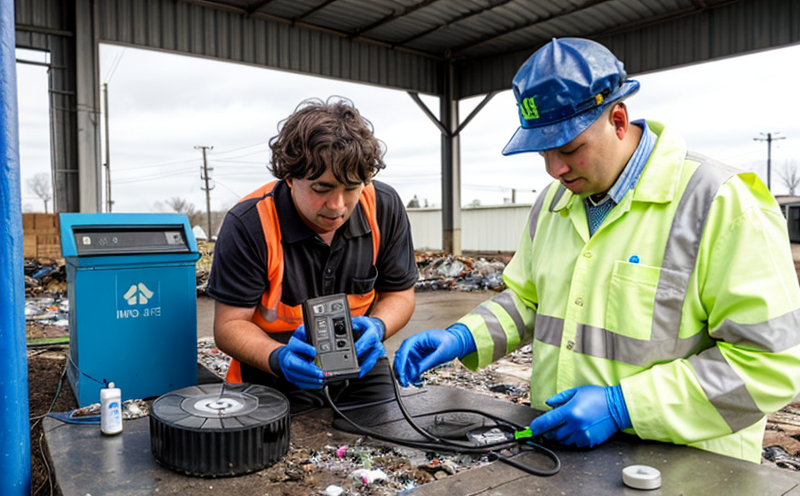CSA Z201 Rechargeable Battery Recycling Standards
The CSA Z201 series of standards is a set of requirements and guidelines developed by the Canadian Standards Association (CSA) for the safe, responsible, and environmentally friendly recycling of rechargeable batteries. This service ensures that electronic waste containing rechargeable batteries is processed in compliance with regulatory and environmental protection frameworks.
The primary objective of CSA Z201 testing is to ensure that recyclers meet stringent criteria regarding battery disassembly, material recovery, and final disposal. These standards are particularly relevant for organizations involved in the electronics sector, such as manufacturers, retailers, and waste management firms. Compliance with these standards can help businesses avoid legal penalties, improve sustainability practices, and enhance their corporate social responsibility (CSR) profile.
The CSA Z201 series is applicable to various types of rechargeable batteries commonly found within electronic devices, including lithium-ion (Li-ion), nickel-metal hydride (NiMH), and lead-acid batteries. The testing process encompasses a range of procedures designed to evaluate the environmental impact of battery recycling processes.
One critical aspect of CSA Z201 is its emphasis on reducing hazardous waste generation during the recycling process. This includes minimizing the release of heavy metals like mercury, cadmium, and lead into the environment. The standards also address worker safety by specifying protocols for handling potentially dangerous materials.
The testing procedure typically involves a series of steps aimed at assessing the efficiency of battery disassembly processes, ensuring that valuable components are recovered while minimizing contamination from non-battery materials. This process is crucial in supporting the circular economy principles embraced by many industries today.
Another key component of CSA Z201 compliance is the proper disposal of hazardous substances extracted during recycling. The standards outline methods for safely disposing of these materials to prevent environmental pollution and ensure public health protection.
Apart from regulatory compliance, implementing CSA Z201 testing offers numerous benefits that can translate into long-term operational advantages. By adhering to these stringent protocols, businesses can enhance their reputation among stakeholders, including customers who increasingly value eco-friendly practices. Additionally, companies may reduce insurance premiums and operational costs associated with potential environmental liabilities.
Finally, CSA Z201 testing supports innovation in the recycling sector by encouraging research into more efficient and sustainable methods of processing electronic waste. This forward-thinking approach can drive technological advancements that further enhance the industry's overall performance.
Scope and Methodology
The scope of CSA Z201 Rechargeable Battery Recycling Standards encompasses the entire lifecycle of battery recycling, from initial collection to final disposal. The methodology involves a series of prescribed steps designed to ensure safe handling, efficient disassembly, optimal material recovery, and proper waste management.
| Step | Description |
|---|---|
| 1. Collection and Sorting | Electronics containing rechargeable batteries are collected and sorted based on type and battery chemistry. |
| 2. Disassembly | Batteries are carefully disassembled to separate components for recycling. |
| 3. Material Recovery | Valuable materials such as cobalt, lithium, and nickel are extracted using appropriate methods. |
| 4. Hazardous Waste Management | Hazardous substances like lead, mercury, and cadmium are disposed of in accordance with regulatory guidelines. |
| 5. Final Disposal | The remaining waste is safely disposed of to prevent environmental contamination. |
This structured approach ensures that all batteries undergo thorough evaluation against the stringent criteria set forth by CSA Z201, thereby promoting sustainable practices within the industry.
Why Choose This Test
- Safety Compliance: Ensures adherence to international safety standards for hazardous waste handling.
- Environmental Protection: Minimizes environmental impact through efficient recycling processes.
- Regulatory Assurance: Provides clear evidence of compliance with relevant laws and regulations.
- Social Responsibility: Enhances corporate image by demonstrating commitment to sustainability.
- Economic Benefits: Reduces operational costs associated with environmental liabilities.
- Innovation Support: Encourages research into more sustainable recycling techniques.
Choosing CSA Z201 testing is essential for organizations aiming to establish robust environmental practices and ensure their operations meet the highest standards of safety and sustainability. This service not only helps businesses comply with legal requirements but also positions them as leaders in responsible waste management within the electronics sector.
Quality and Reliability Assurance
- Thorough Audits: Regular audits ensure ongoing adherence to standards throughout the recycling process.
- Advanced Monitoring: Continuous monitoring of key performance indicators (KPIs) guarantees consistent quality output.
- Expert Consultation: Access to industry experts provides valuable insights and guidance on best practices.
The reliability of CSA Z201 testing is underpinned by a robust framework that includes stringent audit protocols, advanced monitoring systems, and expert consultation services. These measures ensure not only compliance but also the continuous improvement of recycling processes, thereby enhancing overall quality assurance within the industry.





